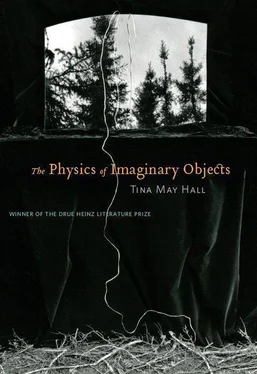Tina Hal - The Physics of Imaginary Objects
Здесь есть возможность читать онлайн «Tina Hal - The Physics of Imaginary Objects» весь текст электронной книги совершенно бесплатно (целиком полную версию без сокращений). В некоторых случаях можно слушать аудио, скачать через торрент в формате fb2 и присутствует краткое содержание. Год выпуска: 2010, Издательство: University of Pittsburgh Press, Жанр: Современная проза, на английском языке. Описание произведения, (предисловие) а так же отзывы посетителей доступны на портале библиотеки ЛибКат.
- Название:The Physics of Imaginary Objects
- Автор:
- Издательство:University of Pittsburgh Press
- Жанр:
- Год:2010
- ISBN:нет данных
- Рейтинг книги:5 / 5. Голосов: 1
-
Избранное:Добавить в избранное
- Отзывы:
-
Ваша оценка:
- 100
- 1
- 2
- 3
- 4
- 5
The Physics of Imaginary Objects: краткое содержание, описание и аннотация
Предлагаем к чтению аннотацию, описание, краткое содержание или предисловие (зависит от того, что написал сам автор книги «The Physics of Imaginary Objects»). Если вы не нашли необходимую информацию о книге — напишите в комментариях, мы постараемся отыскать её.
The Physics of Imaginary Objects,
The Physics of Imaginary Objects — читать онлайн бесплатно полную книгу (весь текст) целиком
Ниже представлен текст книги, разбитый по страницам. Система сохранения места последней прочитанной страницы, позволяет с удобством читать онлайн бесплатно книгу «The Physics of Imaginary Objects», без необходимости каждый раз заново искать на чём Вы остановились. Поставьте закладку, и сможете в любой момент перейти на страницу, на которой закончили чтение.
Интервал:
Закладка:
The way you slather honey and sugar on fry-bread.
I know it is too soon to feel anything moving, but there is a flickering inside me.
Country music coming from the transistor radio in the gift store. A magnet cut into Jesus on the cross, red rhinestone chips for blood.
Hand-lettered signs that lined the dirt road. I say, “That shit will kill you.”
The guy who works at the video store and wears shiny too-tight cowboy shirts, whose mouth tried to chew away the poppy seed trail of my freckles.
Crooked acrid marker letters spelling, Happiness is submission to God.
When we were kids playing fatal disease, you always had cancer; I always died for love.
The photo that will show us standing next to a plaster fish, how scared we look even with our mouthfuls of fry-bread and movie-star sunglasses.
Your long fingers sorting tiny arms and legs and houses. Milagros. Miracles. Hammered tin in the shape of wishes.
The way you squint when you lie.
I buy two thick translucent candles for $1.50 each. You buy one of the small metal hearts.
The second gift you gave me: half of a blood orange that your mother bought by mistake.
My bookcase arranged alphabetically. Your T-shirts ordered by color.
The gift store woman hands you change. I ask what you will wish for and you say, “a pure heart.”
The mission, white and lined and heavy-doored.
Afternoon.
My chest aches from the heat.
You kiss my cheek and leave a honey imprint that itches as it dries.
When you told me about it, I said, “Two dead lovers are no proof.” I said, “Why do you always have to outdo me?”
Our hands touching as we pull the door wide, benediction of cool air.
The year you painted the same picture fifteen times and I killed six ficus trees.
You say, “How old is this guy anyway?”
Holy water fingerprints stinging our foreheads, saints scaling adobe walls wearing red and white satin.
The way you talked too loud as you drove us here. The way I could still hear the pavement groaning beneath us.
On the left, a statue of St. Francis, lying on his back, so small and withered.
The summer we were virgins and your brother caught us kissing in your backyard.
Another flicker, somewhere lower.
A bank of candles, lighting and unlighting themselves over and over.
You said as we turned off the highway, “So, how does it feel, this thing growing inside you?”
The places you touch St. Francis: his neck, his thighs, his stomach.
The matching Celtic knots we were going to get tattooed on our hipbones until we decided to buy each other diamond earrings instead.
Recorded tour whispering from small cheap speakers.
The day you came to my house crying because asparagus was out of season and I sang Johnny Cash songs to you until my throat hurt.
Your fingers sifting through the clusters of snapshots, milagros , notes, and hospital bracelets that shroud St. Francis.
The black tuxedo pants that we both have, the Mondays we swim at the Y.
Bells chime four o'clock. The candles fade and brighten.
When we were driving here you asked what I would wish for and I said, “Enough rain to make mud, something we can sink into.” You said, “Be serious.”
I light both of our candles with your lighter.
The recording starts over.
How we laugh at women who wear bikinis, how we smirk when someone says love.
The month you wouldn't talk to me. The winter you slept on my couch.
I hold your candle upside down to catch the flame until three pale drops scald my wrist.
The brown scarf you loaned me that I never gave back.
How you pretended to cough all the way from Tucson until I said, “You can stop that. I know you aren't really dying.”
The girlie magazines we used to steal from my father's dresser.
The saints turn their faces into the walls, away from the sight of so many waxen hopes.
Cracked Plymouth vinyl burning the backs of our thighs as we counted saguaros for thirty miles.
The day you found your baby tooth in my wallet and called me hopeless.
I hand you a candle and you put it between the turned-out feet of St. Francis.
The pomegranates we eat compulsively, the way the fruit numbs our mouths.
A poem I wrote for you that you hated because I called you slick-backed and straw-veined.
Summer. A cracked mission rising from the desert. The quality of light.
The mornings you call before breakfast to read me headlines.
We open the door to leave, and the arches of the ceiling falter at the sudden brightness.
The smell of you: turpentine, smoke, apricot.
You gasp at the first rush of heat. The fish in the courtyard mimics you.
I say, “What did you wish?”
The stone cat's whiskers tremble above us.
The two years we lived together and got our periods every month on the same day.
You open your hand to show me the miniature heart and say, “Nothing.”
The mission pales behind you. Its faint histories of rain grow wider. You say, “I didn't trust that shriveled little man.” You say, “Take it.”
The desert's stiff exhalations.
The way your fingers fumble as you remove the silver chain I gave you for your last birthday and slide the charm onto it. The way the clasp pinches my skin as you fasten it.
Places to find milagros: saints' dresses, gift stores, rearview mirrors, buried in backyards.
The tin heart whispers as it shifts over my collarbone. I say, “This is a mistake.”
You squint as if you don't hear me.
Step closer to me so your face won't be in shadow.
You say, “Shh, I am remembering something.”
All the Day's Sad Stories:A Novella
Some Kind of Omen
This is the year of beautiful trees. Cold nights, bright days, roadsides aflame. The wind blows, and maple leaves splatter the sidewalk. Mercy and Jake stand in the front yard raking. She has never had a false alarm; the blood comes as regularly as ever. Hopes are kept banked. The waiting extends only two weeks. It makes Mercy feel as if she is in some kind of dream in which they aren't really trying at all. Or as if the world in which she is living and breathing and menstruating is divorced completely from the landscape of her mind, which is cluttered with tired images of seeds and buds and petals unfolding, fruit ripening. The next morning, Mercy sees the first ginkgo leaf break from the tree and hurries outside. Dying, old, perseverant locusts rasp on the trunk; the leaves come down like wings slicing against her face. In less than twenty minutes it is over; the branches are clean, and a circle of gold spreads around her.
Roadside Attractions
One day, surprised by her reflection in a store window, Mercy realizes she is aging. The meat of her face is beginning to sag and pool. Her neck has a crepe-paper cast. She is thirty-seven, and it is ridiculous to be noticing such things. Bone loss, birth defects, mammogram. These are the words that float up to her from the car radio. She loves museums. She'll stop for anything claiming to be one, even those in people's houses by the side of the road. In Yuma, she paid two dollars to see an old man's collection of forks. They were arranged in cardboard soda flats lined with felt. One fork had a picture of Truman on the handle. In Kansas, a sign for a museum of Horrors and Oddities led to the detached garage of a blue ranch house. Metal shop shelves were stacked with boxes. A man sitting in a nylon and aluminum lawn chair inside the garage asked what kinds of oddities she was looking for. “Teeth, skulls, fetuses?” he said. She said she wasn't really into body parts. “Sweetheart, it's all body parts,” he said. He asked what she did for a living. Then he took a box from the shelf next to him. It was close at hand, probably the first thing he showed everyone. It was a lampshade with no lamp, translucent and browning. “Human skin,” he said. “Circa Nazi.” That museum was free.
Читать дальшеИнтервал:
Закладка:
Похожие книги на «The Physics of Imaginary Objects»
Представляем Вашему вниманию похожие книги на «The Physics of Imaginary Objects» списком для выбора. Мы отобрали схожую по названию и смыслу литературу в надежде предоставить читателям больше вариантов отыскать новые, интересные, ещё непрочитанные произведения.
Обсуждение, отзывы о книге «The Physics of Imaginary Objects» и просто собственные мнения читателей. Оставьте ваши комментарии, напишите, что Вы думаете о произведении, его смысле или главных героях. Укажите что конкретно понравилось, а что нет, и почему Вы так считаете.












